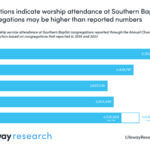
NASHVILLE (BP) – This weekly Bible study appears in Baptist Press in a partnership with Lifeway Christian Resources of the Southern Baptist Convention. Through its Leadership and Adult Publishing team, Lifeway publishes Sunday School curricula and additional resources for all age groups.
This week’s Bible study is adapted from the Bible Studies For Life curriculum.
Bible Passage: 2 John 1-9
Discussion Questions:
- What actor’s performance in a movie stands out in your mind?
Food for Thought by Freddy Cardoza:
As a teenager, my first job was working in a movie theater and video store in my hometown. Through that work, I became familiar with many unforgettable movies and actors’ performances. These included both modern films and actors, as well as movies and performers of yesteryear.
I couldn’t articulate why some actors made such an impression on me, but as I learned more about acting it began to make sense. Method actors are likely to be trained thespians. The original actor, Thespis, performed in ancient Greek amphitheaters. Actors were called hypocrites, a Greek word meaning “one who wears a mask.” These hypocrites shielded their identity to play a role as someone else.
Today, some Christians are actually called hypocrites: mask-wearing fakes. This perception may be unfair and perhaps unfounded, but it’s still believed by many in our culture. As believers, though, we can commit ourselves to becoming authentic disciples who indeed mirror the character of Christ. When people see us they see Jesus, and there is no conflicting message in the word we deliver.
Second John begins by the author identifying himself as the “Elder.” Church tradition and the standard evangelical dating of Bible books make it clear this was none other than the apostle John, who wrote the letter after being exiled by the Roman Emperor Domitian on the Greek island of Patmos.
The primary purpose of this epistle is to address a destructive teaching that was being circulated. John warned the people about divisive ideas being taught among members in their local church. It involved errors about the identity and nature of Jesus Christ (vv. 1,3). The deceptive teaching involved two grave offenses being committed: heresy and blasphemy. Heresy is false teaching regarding a major Christian doctrine. Blasphemy is teaching or behavior corrupting the name or character of God.
While exposing these matters, John used the occasion to explore foundational themes essential to the Christian life. In doing so, he provides us with tremendous insight into his understanding of the Christian life.
Three key teachings are outlined that will keep us from the type of theological error that could cause us to abandon the faith (vv. 2-4). These same principles undergird the doctrine of sanctification that serves as the cornerstone to Christian discipleship. Together, these principles set us apart in the way we live.
The three principles of growing in Christlikeness are abiding in truth (vv. 1-4), love (vv. 3, 5-6), and obedience (vv. 4, 6, 8-9).
John mentions the first principle, truth, five times in the opening four verses. He specifically discusses the concepts of loving, knowing, remaining, being, and walking in truth. Clearly these things were important. They signaled that truth was an absolute priority for him and his audience. Likewise, love and obedience are essential aspects of the Christian life.
John begins verse 3 with a three-fold blessing: grace, mercy and peace. God extends these wonderful spiritual realities into the lives of those who know, believe, love and honor the truth. And for the most part, the believers there were doing that. Note that John begins by extending a kind salutation to the group, including his recognition that truth was a priority for them. But his comment clearly reveals his awareness that only “some” of the believers were walking in truth, despite the command they had received from God (v. 4).
This passage is so relevant to us because we live in a time when some have such a lackadaisical view of truth and shallow knowledge of Scripture that we could see such an error being tolerated. The danger of accommodating false doctrine or not remaining in Christ’s teaching is a constant threat in the lives of believers. If our work is not built on the truth, the impact of the Gospel will be stifled in our lives. Let’s be aware of this tendency to drift, and fight to hold onto “the faith that was delivered to the saints once for all” (Jude 3).
— Freddy Cardoza is dean of Grace Theological Seminary and dean of the School of Ministry Studies at Grace College in Winona Lake, Indiana.
Bible Studies for Life connects the Bible to life for adults, students, and kids. Bible Studies for Life helps individuals and groups know God’s Word through trustworthy content, creates biblical community through engaging and conversational group studies, and helps people engage the culture missionally by unpacking what the Bible says about real-life issues. More information can be found at Lifeway.com/biblestudiesforlife.





















